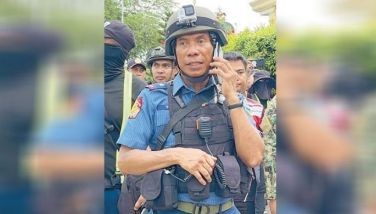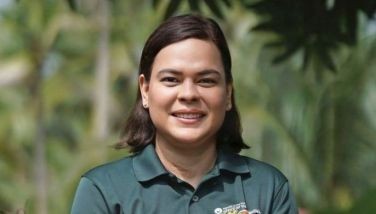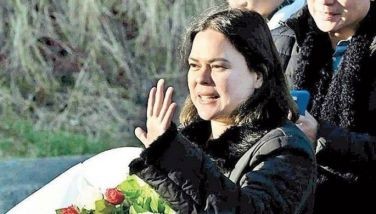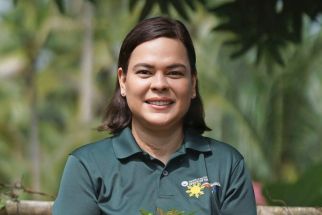The day sports stopped
February 18, 2006 | 12:00am
There are many occasions when we figuratively say the world stops for a sporting event. Depending on who’s competing, it could be the Olympic Games, SEA Games, a world title fight, the NBA Finals, the Super Bowl, and so on. Everyone’s at home, watching it on TV. It’s a rare occasion when you remember where you were when a particular event happened.
But what about the days when sports stops? On the depressing side, there are terrorist acts, like the destruction of the World Trade Center on that dark day in September still burned into our memories. And there are very, very rare instances when you feel change, not gradually and glacially, but an instantaneous evolution in a people’s mass consciousness. Like the EDSA revolution.
I lived in my mother’ s house in Cubao, so we were just a stone’ s throw away from where it all happened. The night it all snowballed, there were reports that top Department of Defense officials, led by Juan Ponce Enrile and Gen. Fidel Ramos, were going to be arrested, and barricaded themselves inside Camp Crame. This led to the mobilization of the August Twenty-One Movement (ATOM), and Jaime Cardinal Sin’s call for people to protect the soldiers.
Stoked by classes in liberation theology, the death of Evelio Javier, Pres. Marcos’s aggressive announcement of snap elections on an American news program, and the farcical reading of tampered election returns at the Batasang Pambansa, students charged the country’s main highway. The crowd swelled, first around Camps Crame and Aguinaldo, then radiated out along Epifanio de los Santos Avenue, filling it all the way up to P. Tuazon in Cubao in the North, and Ortigas Avenue southbound.
Here we were, two weeks from graduation, where I was mulling my plans for a future career in broadcasting in general, choosing between hard news and sports (I would end up doing both). I had never been political, but inexorably was pulled into the awareness of the situation, particularly by classmates who were personally involved: my best friend Vince Concio (a nephew of Ninoy Aquino), and Alya Honasan (sister of Gringo). Neither shared my passion for sports, but were clearly possessed of a keen awareness of the issues of the day. Needless to say, I was rocked out of my comfortable little world, particularly when classes were cancelled because of the revolution itself. I had to be there.
Funny how a two-kilometer walk flies by when there’s so much going on. It was a growing carnival on the streets, people strangely smiling, vendors hawking their wares. Ironically, there was much order, despite the lack of the despised authorities. I ended up with Vince at Gate 5 of Camp Aguinaldo, where we were tasked (by no one in particular) to feed people so that they wouldn’t leave. I smiled to myself that this might be good training for a future career in catering.
Humor aside, I had never experienced such abundance. That little concrete waiting shed became a veritable fortress of food. Someone drove up and unloaded a trunkload of lechon manok (a new delicacy at the time). Someone else staggered in with cartons of dozens of hardboiled eggs. Someone else handed us boxes of warm hamburgers, fresh from a fast food joint. And we felt bulletproof, surrounded on three sides by walls made of sacks of rice, which we had no idea how we were going to cook.
What strikes out most vividly in my mind was how magical Cory Aquino’s name was. Every two hours, when thousands of people milled around us like sharks boring in for the kill, we needed an orderly system to distribute food. All we had to do was shout that they needed to line up in the name of the country’s new president, and it was done. Instantly, without pushing or shoving. Frankly, seeing people line up that way itself was a once-in-a-lifetime experience for me.
But there was real fear in the air, too. Each time an aircraft flew overhead, we hastily rushed to form a human barricade in front of the gate, dampen our handkerchiefs in an inadequate attempt to protect us from tear gas, locked arms, and thanked each other for our friendship, amidst childish, half-joking wails of "I don’t want to die!" The color only returned to our cheeks when Gen. Ramos would announce over the radio that the incoming aircraft had now defected.
If there were any Olympic strength events during the time, I would have fielded members of the crowd. In an unusual reversal, I saw people lift a bus to block the intersection of EDSA and Ortigas. (Remember, there was no flyover then.) In an even more amazing display, they fortified the roadblock by yanking out the center-island fence on Ortigas — which was anchored in concrete, mind you — by hand. This was not a crowd you wanted to mess with.
The next job was to collect religious statues. Small bands of us, functioning on pure adrenaline, hopped into cars — yes, the crowds parted to let us through — and rushed to every church we could think of. We gathered every saint in the book, to use to block tanks and armored personnel carriers. We made sandwiches, garlands and snack packs to offer to opposing soldiers. This was not a crowd you could bring yourself to mess with.
When it was all over, the spirit in the air was uplifting. Whatever the motive, whatever the allegiances, the people wanted change, and made it happen.
Today, people everywhere are trying to lay claim to a piece of that glorious moment. As they say, the winners write the history books. If everyone who claims to have been there went back today, there would practically be nobody left at home.
What irks me is that most of us went back to our lives to quietly work on our democracy, and didn’t need credit for what we did. For better or for worse, it was something we felt needed to be done at the time. That’s probably why I went full-time into sports after a flirtation with hard news. You get what you work for, and results are created in the moment you are most challenged.
Twenty years ago, it was something that needed to be done, and it was a heroic deed for many of us, on many levels. We risked our lives, no doubt about that. Today, two more things needed to be done. We need to reflect on what we have done with the golden opportunity we asked history to give us. And we need to honor the spirit of those who were really there, not the people in the limelight of power who benefited the most, but the ordinary people who stepped back into their ordinariness, after a fleeting moment of changing the course of a democracy.
But what about the days when sports stops? On the depressing side, there are terrorist acts, like the destruction of the World Trade Center on that dark day in September still burned into our memories. And there are very, very rare instances when you feel change, not gradually and glacially, but an instantaneous evolution in a people’s mass consciousness. Like the EDSA revolution.
I lived in my mother’ s house in Cubao, so we were just a stone’ s throw away from where it all happened. The night it all snowballed, there were reports that top Department of Defense officials, led by Juan Ponce Enrile and Gen. Fidel Ramos, were going to be arrested, and barricaded themselves inside Camp Crame. This led to the mobilization of the August Twenty-One Movement (ATOM), and Jaime Cardinal Sin’s call for people to protect the soldiers.
Stoked by classes in liberation theology, the death of Evelio Javier, Pres. Marcos’s aggressive announcement of snap elections on an American news program, and the farcical reading of tampered election returns at the Batasang Pambansa, students charged the country’s main highway. The crowd swelled, first around Camps Crame and Aguinaldo, then radiated out along Epifanio de los Santos Avenue, filling it all the way up to P. Tuazon in Cubao in the North, and Ortigas Avenue southbound.
Here we were, two weeks from graduation, where I was mulling my plans for a future career in broadcasting in general, choosing between hard news and sports (I would end up doing both). I had never been political, but inexorably was pulled into the awareness of the situation, particularly by classmates who were personally involved: my best friend Vince Concio (a nephew of Ninoy Aquino), and Alya Honasan (sister of Gringo). Neither shared my passion for sports, but were clearly possessed of a keen awareness of the issues of the day. Needless to say, I was rocked out of my comfortable little world, particularly when classes were cancelled because of the revolution itself. I had to be there.
Funny how a two-kilometer walk flies by when there’s so much going on. It was a growing carnival on the streets, people strangely smiling, vendors hawking their wares. Ironically, there was much order, despite the lack of the despised authorities. I ended up with Vince at Gate 5 of Camp Aguinaldo, where we were tasked (by no one in particular) to feed people so that they wouldn’t leave. I smiled to myself that this might be good training for a future career in catering.
Humor aside, I had never experienced such abundance. That little concrete waiting shed became a veritable fortress of food. Someone drove up and unloaded a trunkload of lechon manok (a new delicacy at the time). Someone else staggered in with cartons of dozens of hardboiled eggs. Someone else handed us boxes of warm hamburgers, fresh from a fast food joint. And we felt bulletproof, surrounded on three sides by walls made of sacks of rice, which we had no idea how we were going to cook.
What strikes out most vividly in my mind was how magical Cory Aquino’s name was. Every two hours, when thousands of people milled around us like sharks boring in for the kill, we needed an orderly system to distribute food. All we had to do was shout that they needed to line up in the name of the country’s new president, and it was done. Instantly, without pushing or shoving. Frankly, seeing people line up that way itself was a once-in-a-lifetime experience for me.
But there was real fear in the air, too. Each time an aircraft flew overhead, we hastily rushed to form a human barricade in front of the gate, dampen our handkerchiefs in an inadequate attempt to protect us from tear gas, locked arms, and thanked each other for our friendship, amidst childish, half-joking wails of "I don’t want to die!" The color only returned to our cheeks when Gen. Ramos would announce over the radio that the incoming aircraft had now defected.
If there were any Olympic strength events during the time, I would have fielded members of the crowd. In an unusual reversal, I saw people lift a bus to block the intersection of EDSA and Ortigas. (Remember, there was no flyover then.) In an even more amazing display, they fortified the roadblock by yanking out the center-island fence on Ortigas — which was anchored in concrete, mind you — by hand. This was not a crowd you wanted to mess with.
The next job was to collect religious statues. Small bands of us, functioning on pure adrenaline, hopped into cars — yes, the crowds parted to let us through — and rushed to every church we could think of. We gathered every saint in the book, to use to block tanks and armored personnel carriers. We made sandwiches, garlands and snack packs to offer to opposing soldiers. This was not a crowd you could bring yourself to mess with.
When it was all over, the spirit in the air was uplifting. Whatever the motive, whatever the allegiances, the people wanted change, and made it happen.
Today, people everywhere are trying to lay claim to a piece of that glorious moment. As they say, the winners write the history books. If everyone who claims to have been there went back today, there would practically be nobody left at home.
What irks me is that most of us went back to our lives to quietly work on our democracy, and didn’t need credit for what we did. For better or for worse, it was something we felt needed to be done at the time. That’s probably why I went full-time into sports after a flirtation with hard news. You get what you work for, and results are created in the moment you are most challenged.
Twenty years ago, it was something that needed to be done, and it was a heroic deed for many of us, on many levels. We risked our lives, no doubt about that. Today, two more things needed to be done. We need to reflect on what we have done with the golden opportunity we asked history to give us. And we need to honor the spirit of those who were really there, not the people in the limelight of power who benefited the most, but the ordinary people who stepped back into their ordinariness, after a fleeting moment of changing the course of a democracy.
BrandSpace Articles
<
>
- Latest
- Trending
Trending
Latest
Trending
Latest
Recommended
































